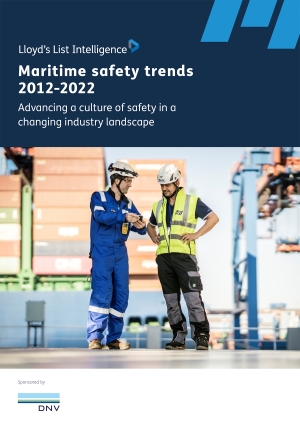


(Posted on 17/05/23)
A new report from DNV and Lloyd’s List Intelligence, “Maritime safety trends 2012-2022: Advancing a culture of safety in a changing maritime landscape”, found a surge in the number of safety incidents involving machinery damage or failure.
With incidents on the rise, more needs to be done to address safety, particularly as the industry faces uncertainties related to decarbonization and digitalization. The analysis found that the overall number of safety incidents increased by 9% in 2022, driven by a 12% increase in incidents involving machine damage or failure. This highlights the importance of developing a better understanding of new technologies and placing equal value on human, organisational and technological elements, helping to cultivate a robust safety culture in maritime companies and within the industry.
“New technologies, alternative fuels and more advanced digital systems offer many solutions, but they also bring increased uncertainty and new risks,” said Knut Ørbeck-Nilssen, CEO Maritime, DNV. “Rules, procedures and guidelines continue to be essential elements, but they mean less if they are not embraced by crew, or if they don’t become ingrained in the safety culture of a company. This will lead to a deeper awareness of the safety hurdles and a more comprehensive understanding of new technologies.”
Maritime stakeholders, are encouraged to collaborate transparently in the safe transition to new fuels and technologies by contributing to the development of training programs that are safe, reliable and realistic. Improved safety can also be achieved through more proactive investment in the psychological and physical welfare of a ship’s crew and onshore workers.
The importance of knowledge sharing and collaboration are also highlighted in the report. The transition to new engine types and new fuels may lead to machine failure and accidents, and shipping companies should share what they have learned from these incidents so that the whole industry can achieve improved safety standards.
“Fundamentally, safe shipping relies on good leadership. We urge all players in the industry to put aside their competitive instincts and contribute to improved safety standards for all. This will ensure that every mistake can be learned from, and we all continue to maintain progress while – much more importantly – minimizing the risk to human life and the environment,” said Ørbeck-Nilssen.
AtoB@C Shipping, a subsidiary of ESL Shipping, has announced the successful delivery of Fleximar, the... Read more
Western Bulk, together with reputable Norwegian partners A/S J. Ludwig Mowinckels Rederi, Premium Maritime... Read more
Pacific Basin Shipping Limited, one of the world’s leading dry bulk shipping companies, has announced... Read more
Columbia Group anticipates a period of strong expansion as an increasing number of international shipowners... Read more
Norse?Ship Management has expanded its use of Smart Ship Hub’s high frequency sensor data and... Read more
As the maritime industry gears up to welcome the IMO’s STCW bullying and harassment training amendments... Read more
NORDEN has acquired the cargo activities of Taylor Maritime in Southern Africa (previously operated... Read more
Philippos Ioulianou, Managing Director of EmissionLink, has warned the IMO’s decision to delay... Read more
VIKAND has highlighted the need for cultural change in the maritime sector as reports of bullying, harassment... Read more
The maritime industry is experiencing a period of significant transformation, driven by rapidly evolving... Read more